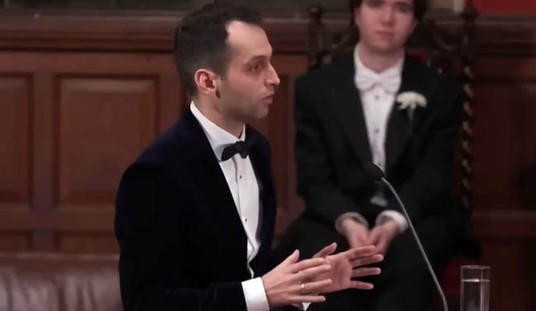Conservatives already dispirited over the outcome of the 2016 cycle might want to pop a Xanax before reading George Will’s latest essay on the state of the Right. The Washington Post columnist paints a dreadful, but realistic, picture of the world facing conservatives no matter the outcome of the general election in six weeks. It’s a time not for choosing as much a time for pessimism, Will writes, because conservatives have seen their party hijacked — and few people appear to care about it:
The American project was to construct a constitutional regime whose institutional architecture would guarantee the limited government implied by the Founders’ philosophy: Government is instituted to “secure” (the Declaration of Independence) preexisting natural rights. Today, however, neither the executive nor legislative branches takes this seriously, the judiciary has forsworn enforcing it, and neither political party represents it because no substantial constituency supports it.
The ease with which Trump has erased Republican conservatism matches the speed with which Republican leaders have normalized him. For the formerly conservative party, the Founders’ principles, although platitudes in the party’s catechism, have become, as former senator Daniel Patrick Moynihan said, “a kind of civic religion, avowed but not constraining.”
The beginning of conservative wisdom is recognition that there is an end to everything: Nothing lasts. If Trump wins, the GOP ends as a vehicle for conservatism. And a political idea without a political party is an orphan in an indifferent world.
This is a consequence of an eclipse within the GOP and the Right of policy in pursuit of gainsay. Over the last several years, starting with the loss of Republican majorities in Congress in 2006 but accelerating during the Barack Obama administration, the Right has seemed more interested in electoral politics than actual legislative accomplishments. Instead of using political leverage that comes with majorities to advance conservative goals through compromise, we began valuing obstruction and gridlock more.
To an extent, that was going to be inevitable. The two-year period of single-party Democrat rule from 2009-11 was a testament to progressive triumphalism, and the need to block that agenda was paramount. However, at a certain point, voters expect more return from their investment than government shutdowns and budget standoffs. The re-election of Barack Obama made it clear that voters wanted some kind of accommodation from both parties. Rather than respond to that, conservatives went right back to making promises that were impossible to keep — like claiming they could force Barack Obama to sign a repeal of ObamaCare, and shutting down the government to get it.
As I write in my column for The Week, the main proponent of no-win obstructionism has found that the monster he helped create has taken a big bite out of his hide since endorsing Trump last Friday:
The conservative movement itself has made it clear that it’s in no mood for compromise or pragmatism. Instead, over the last few years, the mood has shifted into a purity campaign that certainly fed into Cruz’s calculations. The purity campaign extended to anyone who’d ever worked across the aisle, even for conservative approaches to contentious issues.
But a funny thing happened on the way to purity. The bitter partisan stalemate resulting from purity campaigns on the right and the left created an electorate that no longer trusts in the political process. The Republican nomination came down to the ideological purist and Donald Trump, the pragmatic outsider who promised voters he’d just get things done — and Trump handily beat Cruz. Democrats nearly dumped the bare-knuckled partisan candidate of Business As Usual for a socialist backbencher in the Senate.
It’s not just the populists, either. Voters across the spectrum have tired of infighting and want solutions — and that means finding ways to work together, rather than wait for promises of victory by sheer force of will over the realities of Congressional majorities and White House control.
Perhaps Cruz, who has a brilliant mind and usually good instincts, understands that he hit the limit of purist politics. It might be that the prosaic truth of the binary choice, plus his ambitions for higher office later, necessitates pragmatism. Either way, Cruz’s endorsement acknowledges the main lesson Trump’s nomination should teach conservatives: Philosophy is not enough in politics. Voters want to see results and solutions, not just stunts. And if they can’t get either from the leaders of the governing class, they’ll go outside the system instead.
I’m a little more optimistic than Will, in this sense: America has not forgotten its founding values. It has, however, lost its patience for a movement that has declined into unseriousness, isolation, and purity battles. When conservatives start working for actual solutions in the context of political diversity, rather than refusing to take part in the process and delivering nothing while demanding that voters give them total power, then perhaps voters will take them seriously as defenders of America’s founding values. In the meantime, it’s pretty easy to see why a candidate who promises to deliver something of value managed to find support.









Join the conversation as a VIP Member